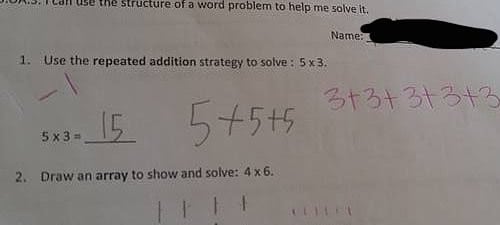A debate, heated in the way only interwebs debates can be, has been raging for the past few days about a math problem. In a nutshell, here’s what happened. The math problem was this:
5 x 3 = _____
The instructions said “use the repeated addition strategy.” The child answered “15” and showed the work as “5 + 5 + 5” which received a -1 in red pen and was accompanied by the feedback that the correct way to apply the strategy was “3 + 3 + 3 + 3 + 3.” Participants in the debate have gone back and forth about important issues such as:
- the difference between equality and equivalence, and
- whether or not this is ultimately very important,
- the quality of the feedback provided by the teacher
- practical significance, e.g. 3mg of medicine 5 times a day vs. 5mg, 3 times a day
I’m not being facetious or tongue-in-cheek when I refer to these as important issues. I think that they are. These are exactly the kinds of discussions we should be having with each other, with teachers, and with students. The very act of having these discussions helps us think through the issues and clarify what is important to us.
However, in my opinion, the only question of real importance is this:
After all is said and done, will this kid still want to do math?
People learn at different rates. The only good predictor of how much someone will learn is the amount of time they spend engaged in learning, frequently referred to as “time on task.” People won’t spend time learning to do something unless:
- They love doing it
- Doing it is instrumental in helping them do something else they really want
- Some forces them to
Our educational system spends almost no time trying to help kids fall in love with the content of their classes, nor does it help them see how the content can really help them improve their lives. We basically resort to the carrot and stick approach and force them to study stuff at gradepoint, despite the fact that we know this kills their motivation.
Ultimately, none of us knows what went on, or what continues to go on, between the student and teacher in this story. There’s probably a lot more to their interaction that any of us can judge from just seeing the image accompanying this post.
For any of you involved with a learner out there, I leave you with what I think the recipe for good learning is:
- Make it interesting, if not downright fun
- Make it relevant to the life they’re living right now
- Create safe spaces to explore, take risks, and learn it in their own time
